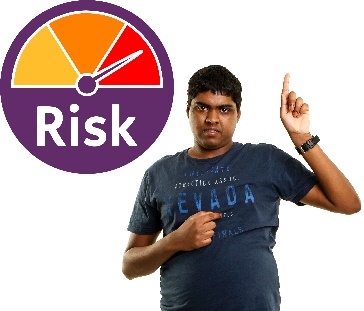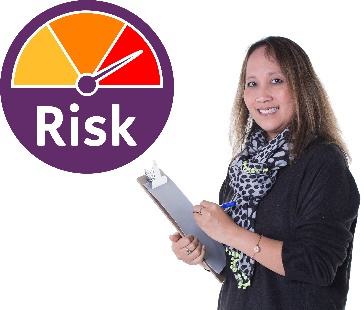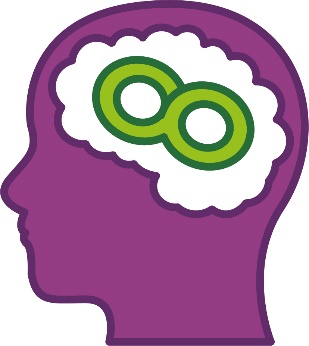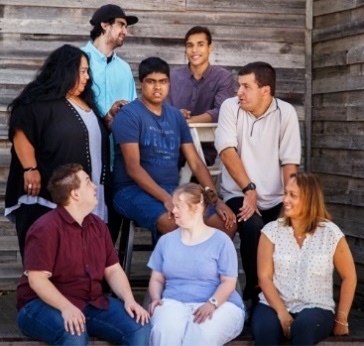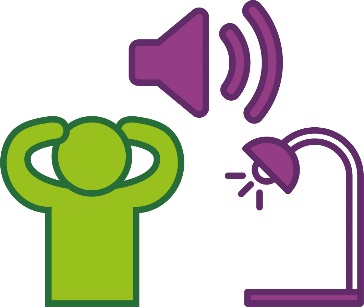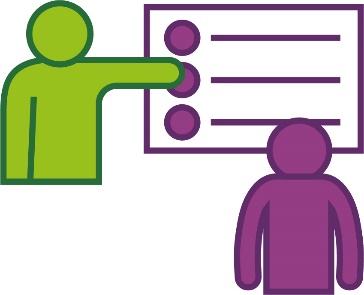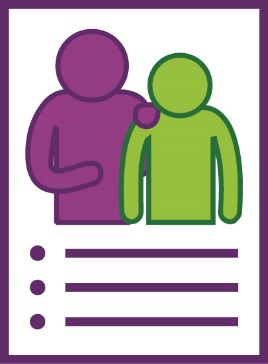What you can talk to your worker about
| You can talk to your worker about anything that will help them support you better. |
| You can talk about:
|
| You can use the NDIS Workforce Capability Framework to find more information about:
|
| You can find the Framework on our website. |
Getting the support you want
| It’s a good idea to talk about how you want your workers to support you. This includes times when you might want to take a risk. | |
| You can think about the questions below. | |
| How do you want your worker to support you? | |
| How do you want your worker to manage risk? | |
| We created 2 examples of how these questions could help you get the support you want. | |
| Example 1: Angelo lives with autism. Autism affects how you:
| |
| Angelo told his worker, Rex, that he wanted to meet new people. | |
| But he doesn’t like noisy or bright places. | |
| Angelo made a plan with Rex and his service provider about how he could:
| |
| Example 2: Aliya is blind. | |
| She had a worker to support her with making meals. But she likes to do as much as she can herself. | |
| At the start of each shift, she asked her worker about any risks they could see. | |
| If they found a risk, they worked together to decide how to make it safer for Aliya to cook her meals. | |
| You can learn more about getting support on our website. workforcecapability.ndiscommission.gov.au/ framework/level#gen_supportMe_0_0 | |
Making sure your worker can support you well
| It’s a good idea to make sure that your worker will support you well. |
| You can think about the questions below. |
| How will you know if your worker can support you well? |
| You might get a new worker who needs to learn how to do a task in your home. Do you want to explain the task to them? Or do you want someone else to explain the task to them? |
| Here is an example of how you could check that your worker can support you well. |
| Gina’s daughter lives with a disability. She gets her food through a tube. |
| Her daughter’s support workers all get training in tube feeding before they start. |
| But when a new worker started to support Gina’s daughter, Gina wanted to train them. She wanted to make sure they knew exactly how to do it. |
| Gina worked with her service provider to give the worker some more training. Once she was happy the worker knew what to do, she asked the service provider to check how they were going. |
| They also used the High Intensity Support Skills Descriptors from our website. This helped them check that the workers were doing what:
|
| You can read about the High Intensity Support Skills Descriptors on our website. It tells you what skills workers need to support people with high daily personal needs. |
| |
| You can learn more about checking your worker’s skills and attitudes on our website. |
| workforcecapability.ndiscommission.gov.au/ framework/level#gen_yourImpact_0_0 |
Understanding what’s important to you
| It’s a good idea to talk to your worker about:
|
| If your worker knows these things, they can help you do what you want in life. |
| Here is an example of how explaining what’s important to you can help you reach your goals. |
| Maya is an Aboriginal woman living in Perth. |
| She has high health care needs. |
| She explained to her worker that she wanted to get back to country and her family. |
| Maya’s worker and service provider talked with her about who could support her with this. |
| Maya chose some people from her community. Together, they planned how to make this work with her:
|
| You can learn more about explaining to your worker what’s important to you on our website. workforcecapability.ndiscommission.gov.au/ framework/level#gen_supportMe_0_0 |
What you can talk to your worker about
| You can talk to your worker about anything that will help them support you better. |
| You can talk about:
|
| You can use the NDIS Workforce Capability Framework to find more information about:
|
| You can find the Framework on our website. |
Getting the support you want
| It’s a good idea to talk about how you want your workers to support you. This includes times when you might want to take a risk. | |
| You can think about the questions below. | |
| How do you want your worker to support you? | |
| How do you want your worker to manage risk? | |
| We created 2 examples of how these questions could help you get the support you want. | |
| Example 1: Angelo lives with autism. Autism affects how you:
| |
| Angelo told his worker, Rex, that he wanted to meet new people. | |
| But he doesn’t like noisy or bright places. | |
| Angelo made a plan with Rex and his service provider about how he could:
| |
| Example 2: Aliya is blind. | |
| She had a worker to support her with making meals. But she likes to do as much as she can herself. | |
| At the start of each shift, she asked her worker about any risks they could see. | |
| If they found a risk, they worked together to decide how to make it safer for Aliya to cook her meals. | |
| You can learn more about getting support on our website. workforcecapability.ndiscommission.gov.au/ framework/level#gen_supportMe_0_0 | |
Making sure your worker can support you well
| It’s a good idea to make sure that your worker will support you well. |
| You can think about the questions below. |
| How will you know if your worker can support you well? |
| You might get a new worker who needs to learn how to do a task in your home. Do you want to explain the task to them? Or do you want someone else to explain the task to them? |
| Here is an example of how you could check that your worker can support you well. |
| Gina’s daughter lives with a disability. She gets her food through a tube. |
| Her daughter’s support workers all get training in tube feeding before they start. |
| But when a new worker started to support Gina’s daughter, Gina wanted to train them. She wanted to make sure they knew exactly how to do it. |
| Gina worked with her service provider to give the worker some more training. Once she was happy the worker knew what to do, she asked the service provider to check how they were going. |
| They also used the High Intensity Support Skills Descriptors from our website. This helped them check that the workers were doing what:
|
| You can read about the High Intensity Support Skills Descriptors on our website. It tells you what skills workers need to support people with high daily personal needs. |
| |
| You can learn more about checking your worker’s skills and attitudes on our website. |
| workforcecapability.ndiscommission.gov.au/ framework/level#gen_yourImpact_0_0 |
Understanding what’s important to you
| It’s a good idea to talk to your worker about:
|
| If your worker knows these things, they can help you do what you want in life. |
| Here is an example of how explaining what’s important to you can help you reach your goals. |
| Maya is an Aboriginal woman living in Perth. |
| She has high health care needs. |
| She explained to her worker that she wanted to get back to country and her family. |
| Maya’s worker and service provider talked with her about who could support her with this. |
| Maya chose some people from her community. Together, they planned how to make this work with her:
|
| You can learn more about explaining to your worker what’s important to you on our website. workforcecapability.ndiscommission.gov.au/ framework/level#gen_supportMe_0_0 |




